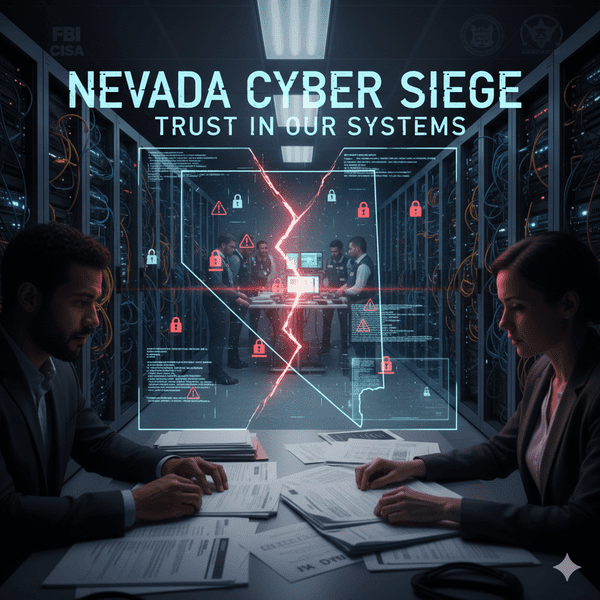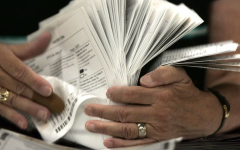
Nevada’s Cyber Siege: What the Ransomware Attack Means for Trust in Our Systems.
By TheNevadaGlobeStaff, October 20, 2025 11:34 am
On August 25, 2025, Nevada’s digital backbone cracked under a ransomware attack, exposing vulnerabilities in the state’s infrastructure. Anomalous activity detected that Sunday morning led to a swift shutdown of affected servers to contain the breach. The result? A cascade of disruptions that halted online and offline services for days, reminding us how intertwined our daily lives are with technology, and how fragile that connection can be.
The systems hit were part of a major “silo” in the state’s data center, impacting agencies like the Department of Motor Vehicles (DMV), Department of Employment, Training and Rehabilitation (DETR), and Health and Human Services. Public-facing websites went dark, portals for unemployment claims and Medicaid froze, and even background checks for jobs or gun purchases stalled. Offline, DMV offices closed temporarily, forcing manual processes like pen and paper transactions. The outage lasted over a week for many services, with full recovery stretching into September. By early October, 90% of sites were back online, but forensic analysis continues, with costs likely in the millions from lost productivity alone.
What was affected? Everyday Nevadans felt the pinch: parents couldn’t access child care subsidies, job seekers waited on benefits, and rural residents faced longer drives for in-person help. Emergency services like 911 remained operational, but the ripple effects hit small businesses needing licenses and families relying on state aid. No physical infrastructure, like power grids, was directly compromised, but the digital dependencies amplified the chaos.
Now, consider this: Nevada’s elections rely on technology too. Voter registration runs through the Voter Registration and Election Management System (VREMS), a centralized platform implemented in 2021 for security. Officials insist it was untouched in this attack, isolated from the breached silo. But is that enough reassurance? If similar vulnerabilities exist elsewhere, could an election year hack disrupt voter rolls, ballot processing, or results reporting? We’ve seen counties like Washoe and Clark invest in air gapped backups and paper trails, but what if attackers target those next? It begs the question: How can we trust tech in our elections when a routine ransomware hit cripples state operations?
Speaking of trust, the same team overseeing cybersecurity, the Governor’s Office of Science, Innovation and Technology (OSIT), is now leading the fix, alongside FBI and CISA experts. Is that appropriate? On one hand, their insider knowledge speeds recovery; on the other, it raises concerns about accountability. Should independent auditors step in to prevent conflicts, or is this standard protocol? Readers, weigh in: Does familiarity breed complacency, or expertise?
Who pulled this off? The attackers remain unidentified, no group has claimed it, though ransomware often traces to criminal syndicates in Russia or Eastern Europe. What did they want? Likely money, given the encryption and data exfiltration. Stolen info’s scope is still “unidentified,” but if personal data like Social Security numbers surfaced, notifications would follow. Will they be found and brought to justice? History says slim odds, global cybercriminals operate in shadows, beyond easy reach. Think about SolarWinds or Colonial Pipeline: Perpetrators often evade capture, emboldened for repeats.
Could this happen again? Absolutely, unless failsafes evolve. Nevada’s pushing $313,000 for threat analysis and a UNLV-partnered security center, plus $500,000 for policy reviews. Backups exist, officials used them for recovery, but are they offline, encrypted, and tested regularly? What about multi-factor authentication gaps or unpatched software that might have invited this?
This isn’t just a glitch; it’s a mirror. What if data stolen includes sensitive health records, fueling identity theft? Or if attackers injected malware that lingers undetected? Who’s smart enough to spot every alteration, state techs, feds, or private firms?
As we approach 2026 elections, ponder: In a swing state like ours, does cyber fragility undermine our Republic? If backups fail or trust erodes, do we revert to paper ballots entirely? Counting by hand as well? Removing all tech from our elections?
Nevadans, the facts are clear, but the implications? That’s for you to decide. In a world where bits and bytes run our lives, how secure is secure enough? Or are we secure at all?
Speak Up, Nevada! What’s on Your Mind? Send us your opinion!
Got the inside scoop on something happening in Nevada? Or the country? Do you have thoughts about life in Nevada that are too good to keep to yourself? Whether it’s a hot take on our politics, crime, education, or even the secret to surviving our summers, we’re all ears! Swing them our way at editor@thenevadaglobe.com. Come on, give us the scoop on what makes Nevada tick—or what ticks you off. Let’s make some noise and have some fun with it!
- DUI Driver Faces Charges After Crash Injures State Police Officer - February 10, 2026
- NBA Board Poised to Vote on Vegas Franchise Bid This Summer - February 10, 2026
- No Serious Injuries Reported After Nevada State Police Shooting on Southbound I-15 - February 10, 2026




